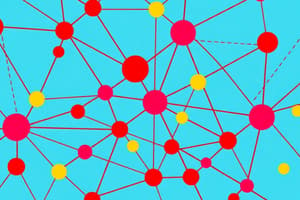Podcast
Questions and Answers
What term is used to describe a node's immediate neighbors in network theory?
What term is used to describe a node's immediate neighbors in network theory?
- Adjacent nodes (correct)
- Remote vertices
- Distant connections
- Far-off links
What is the study of interconnections between nodes or vertices called?
What is the study of interconnections between nodes or vertices called?
- Graphology
- Topography
- Cartography
- Network theory (correct)
In network theory, what is a path that starts and ends at the same node called?
In network theory, what is a path that starts and ends at the same node called?
- Loopback line
- Circular connection
- Closed loop (correct)
- Circuit breaker
What term is used to describe the strength of connections between nodes in network theory?
What term is used to describe the strength of connections between nodes in network theory?
In network theory, what theorem states that the total voltage around a closed loop in a circuit is zero?
In network theory, what theorem states that the total voltage around a closed loop in a circuit is zero?
In the context of network theory, which term describes the number of links connected to a node?
In the context of network theory, which term describes the number of links connected to a node?
What theorem in network theory states that any linear electrical network with voltage and current sources can be replaced by an equivalent circuit consisting of a single voltage source and a single series resistor?
What theorem in network theory states that any linear electrical network with voltage and current sources can be replaced by an equivalent circuit consisting of a single voltage source and a single series resistor?
What type of path in network theory starts and ends at the same node?
What type of path in network theory starts and ends at the same node?
What theorem in network theory states that any connected graph with |V| vertices and |E| edges satisfies the equation |V| - |E| + |F| = 1, where |F| is the number of regions formed by the edges?
What theorem in network theory states that any connected graph with |V| vertices and |E| edges satisfies the equation |V| - |E| + |F| = 1, where |F| is the number of regions formed by the edges?
In network theory, what term is used to describe the measure of how easily electrical current can flow through a component?
In network theory, what term is used to describe the measure of how easily electrical current can flow through a component?
What do we call a path in a graph that visits every vertex exactly once and returns to the starting vertex?
What do we call a path in a graph that visits every vertex exactly once and returns to the starting vertex?
Which theorem in network theory states that the voltage across two points in a network is equal to the current flowing between those two points multiplied by the equivalent resistance between them?
Which theorem in network theory states that the voltage across two points in a network is equal to the current flowing between those two points multiplied by the equivalent resistance between them?
Flashcards are hidden until you start studying
Study Notes
Network Theory Terminology
- In network theory, a node's immediate neighbors are referred to as its adjacent nodes.
Graph Theory
- The study of interconnections between nodes or vertices is called graph theory.
Path Types
- A circuit is a path that starts and ends at the same node.
- A Hamiltonian cycle is a path that visits every vertex exactly once and returns to the starting vertex.
Connection Strength
- The strength of connections between nodes in network theory is described by the term conductance.
Theorems
- Kirchhoff's Voltage Law (KVL) states that the total voltage around a closed loop in a circuit is zero.
- Thevenin's Theorem states that any linear electrical network with voltage and current sources can be replaced by an equivalent circuit consisting of a single voltage source and a single series resistor.
- Euler's Formula states that any connected graph with |V| vertices and |E| edges satisfies the equation |V| - |E| + |F| = 1, where |F| is the number of regions formed by the edges.
- Ohm's Law states that the voltage across two points in a network is equal to the current flowing between those two points multiplied by the equivalent resistance between them.
Node Properties
- The number of links connected to a node is described by the term degree.
- The measure of how easily electrical current can flow through a component is described by the term conductivity.
Studying That Suits You
Use AI to generate personalized quizzes and flashcards to suit your learning preferences.




